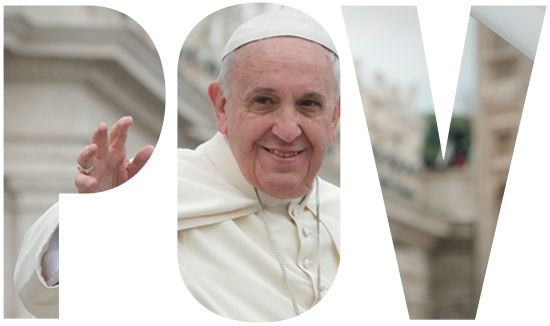POV: Pope Francis’ Statement on Marriage and Family Life
Groundbreaking document seeks to transform the way Catholics live

Photo courtesy of Flickr contributor Aleteia Image Department
When Pope Francis last month issued Amoris Laetitia (The Joy of Love), a statement on marriage and family life, critics variously thought he didn’t change enough of the rules (“still no gay marriage!?”) and that he softened too many (“priests are supposed to be nice to divorced and remarried Catholics even though they have committed a mortal sin?!”). I think both camps missed the main lesson Francis put forward.
I am a Catholic practical theologian–religious educator by training and the director of BU’s Doctor of Ministry in Transformational Leadership program. So when I look at the pope’s writings, I ask, what is he trying to teach? and what transformation is he trying to lead?
This document resulted from two years of conversations, surveys, and meetings among bishops, priests, and laypeople from around the world. It addressed not only Catholics in Europe, Australia, and North America (about 367 million people), but also those in Latin America, Africa, Asia, and the rest of Oceania (about 800 million people), who tend to hold more traditional understandings of marriage than here in the West.
Francis begins by talking about families and marriages in the Bible, and in so doing starts to surface his transformational priorities. He suggests that people not focus on what the rules are, but instead concentrate on how they live, how they cultivate virtues, how they love one another.
He itemizes some of the problems of contemporary Catholic marriage and family life, including the challenge of letting go of individual priorities for the sake of creating a communal whole in the family. He is clear that marriage and families are difficult and complex relationships. He sticks to his transformational message: we have rules, yes, but they paint an ideal picture rather than provide useful guidance for helping people live in the messiness of hard, complex relationships. For that, we need to practice virtues such as tenderness.
It is in the fourth chapter that Francis really starts his main teaching agenda. He explores how to love, using the description of love in Paul’s first letter to the Corinthians (1 Cor 13:4-7) as the outline of his lesson. He describes in detail how to practice these virtues of love in a contemporary family. This is not about rules. This is about how to love other people, including those who don’t follow the rules. The pope goes deep here on how to practice patience, kindness, generosity, forgiveness, joy, hope, strength, endurance, sharing, and dialogue in complex relationships. He offers ways to serve others and avoid such dark habits as jealousy, boasting, rudeness, irritability, and resentment for the sake of making complex relationships work. This is a wonderful collection of wisdom for anyone (regardless of gender identity, divorce history, or background in rejection or abuse) trying to love another in the face of life’s stresses.
In all of his teaching in this document, Francis continues to emphasize that the way one lives, the virtues one practices, and the relationship one cultivates with God are the most important aspects of Catholic relationships: for couples, parents, children, priests, and other Catholic leaders. He even suggests that a heavy emphasis on the rules may have driven some Catholics away from participating in marriage. This shift in emphasis requires a substantial transformation in Catholic teaching in the United States, at least.
Virtue development as an educational practice takes time and a fair amount of experiential learning in families and in church. In the last 10 to 15 years in the United States, the Catholic religion curriculum has emphasized doctrine, because the bishops were concerned that Catholics didn’t know the whys of their practices. The pope seems to imply that the pendulum swung too far toward the doctrinal formulas. He is, in essence, presenting an alternative curriculum that is about having young people and adults practice the skills and dispositions necessary for loving in complex contexts.
Overall, Francis is trying to transform the way Catholics live. He is trying to draw attention away from a heavy reliance on the lowest common denominator of a set of doctrinal rules. Those rules matter, but they matter after a Catholic has made a valiant effort to live the way that Jesus modeled, with openness to God’s grace.
The Catholic Church transforms very slowly. If it is ever going to change the rules for divorced and remarried Catholics or for LGBTQ partnerships, it will be only after it has heard the voices of many Catholics who have lived in such situations for 50 or 60 years. The Church will have to reflect theologically on the hard work these Catholics put into cultivating the virtues of love and community in their families, the grace God showed them, and the fruits of their efforts.
Eileen M. Daily, a School of Theology lecturer and director of the Doctor of Ministry in Transformational Leadership program, can be reached at edaily@bu.edu.
“POV” is an opinion page that provides timely commentaries from students, faculty, and staff on a variety of issues: on-campus, local, state, national, or international. Anyone interested in submitting a piece, which should be about 700 words long, should contact Rich Barlow at barlowr@bu.edu. BU Today reserves the right to reject or edit submissions. The views expressed are solely those of the author and are not intended to represent the views of Boston University.
Comments & Discussion
Boston University moderates comments to facilitate an informed, substantive, civil conversation. Abusive, profane, self-promotional, misleading, incoherent or off-topic comments will be rejected. Moderators are staffed during regular business hours (EST) and can only accept comments written in English. Statistics or facts must include a citation or a link to the citation.